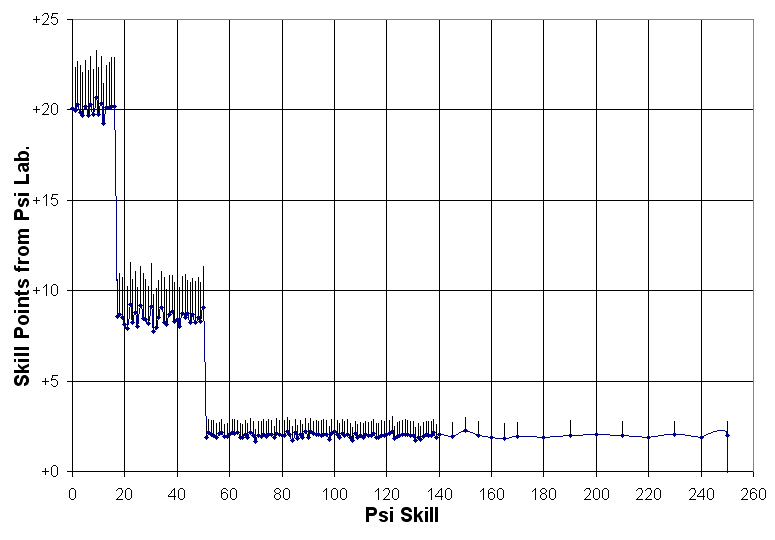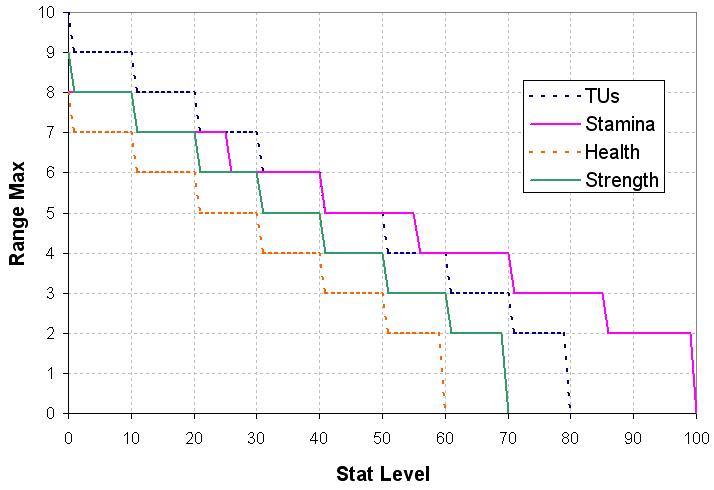User talk:MikeTheRed
Here be more detail than you ever wanted to know. Please put comments/question in italics. If you want an email reply, either be a regular of here or xcomufo.com, make a User page, or just type in yer email addy.
The Experience of Experience
A.K.A. more details than you ever wanted to know, about testing XCOM:UD 1.4 experience counters versus stat increases
My observations under Experience are getting incredibly long-winded. And at the same time, I am doing yet more research on it. So I've made this space to put levels of detail that are way more than a casual player is interested in. I will probably move some stuff out of Experience and over to here as I polish the info.
My Test Setup
For my testing, I have a MS Access VBA module that sucks in a savegame and compares it to another one (from before the combat). I edit experience counters (offsets 80-85 in UNITREF.DAT) and soldier stats (bytes 43-62 in SOLDIER.DAT) from a savegame ready to be ended (a Muton base with 16 soldiers standing in the entry area). Although it took weeks of futzing with Access to get it set up nicely, now that it's done, I can generate each combat-mission skill-point result in as quickly as I can load a savegame, end the mission, and then savegame on the geoscape (approx. 15 seconds). As of this writing, I have 4,544 individual soldier results (a.k.a. 284 savegame results at 16 soldiers each). This was for 11 different configurations of experience counters and soldier stats, as I zeroed in on different questions to ask (an average of about 25 savegames per configuration).
FWIW, the Psi Lab training tests were way easier than combat-mission experience-vs.-skill-point tests. For three reasons: 1) I only had 16 soldiers in my base combat-mission scenario, whereas I could use all 250 soldiers when testing the Lab. (It took a lot of manual Soldier.Dat hacking, though!) 2) The Psi Lab results were much more simple and clear vs. combat results, as the wiki shows. Finally, 3) only one stat was being looked at, whereas combat results can affect 9 stats, each of which has to be examined in its own way. For the Psi Lab tests, I quickly generated 8,500 datapoints (34 savegames) and within just two different savegame configurations, it's behavior was crystal clear. (I didn't include these 8,500 results in the 4,544 counts I mentioned for combat results, of course.)
I'm happy to share my MS Access setup with anybody that wants it; just send me an email. But you are warned - it's all home grown code. I'll walk you through it, but you have to do it exactly right... there ain't no user manual or Help routines for this baby! You coders know what I mean. Also, just so you know... the only thing it does relative to game files, is read Soldier.Dat. It doesn't touch any other file, and it doesn't write to anything (except itself, of course). I did all my Soldier and Unitref hacking by hand.
FWIW, at first I used Hex Workshop to hack Soldier and Unitref (thanks Danial!), but lately I've only been using EDIT... I couldn't figure out a way to make HW "remember" where to place its structure overlays, and it's a hassle to place them back on all 16 soldiers every time I use it. (If anybody knows a way to get HW to remember where they should be placed, let me know!) In the long run, I find it easier to just scroll through Soldier or Unitref with EDIT. Either way is real work, but at least with EDIT, it's "just show me the #$@!$ bytes!" I also wish HW had a wider data view (with smaller fonts for it) and would let you re-arrange the fields shown in the structure overlay in whatever order you want (i.e., one that makes more sense for my purposes than their somewhat scattered layout).
Testing Skill Point Increase
For anyone who's interested in testing combat mission experience vs. resulting skill point increases:
- You only need to edit the experience counters in UNITREF, and the soldier stat values in SOLDIER. That is to say, XCOM does not carry the soldier stat values in UNITREF back to the geoscape... it just re-reads them out of SOLDIER. So stats in UNITREF are "read only" (for that combat only) and lost when combat ends. The "Kills" variable is the only value I know of in UNITREF that's directly carried forward into the geoscape, although other things like experience counters (for skill increase) and health (for hospitalization) indirectly carry forward / affect values in the geoscape.
Non-Randomness
This section only applies to primary skill increases:
When I've talked about experience rolls, I've made it sound like you always get the average (halfway between the ranges). But this is definitely not the case, especially when there are very few experience points (EPs) in UNITREF offsets 80-85. Specifically, when there are only 1 or 2 primary actions - the first 'step' for primary skill points - I saw very weird, non-random stuff. Example: I would set up 16 soldiers, with only 1 or 2 EPs for each soldier. When I ended the combat, the skill point range was undeniably 0-1. But far more often than not, the 16 soldiers in my test crew would all get 0 skill points, all across the board. Then every now and then they would all get 1 skill point, all across the board. And even less often, there would be a mix of 0s and 1s in the results. The actual average increase was about 0.2 points, not the 0.5 points I wrote in Experience. To this day, I cannot get a handle on what is triggering them to all be 0 or 1. My best guess is that it is based on some high-level bit mask over the system clock... it seems to come and go in unpredictable spurts. (If this is true, it's possible that my DosBox wrapper is messing with the results. But then, it would be for anyone using DosBox.) I did my testing by reloading and combat-ending about a dozen different hacked combat-mission savegames (as I zeroed in on issues to test) hundreds of times in sum total, so I can never be sure my problems weren't caused by the simple fact that I was reloading a few games many times, instead of racking up experience points au natural, where some unknown randomness seed might be being kept somewhere.
Anyway, I kept the main wiki summary simple, and just strongly advised people to try to get at least three primary actions. Although 1-2 actions was weird, by 3 actions I saw little non-randomness. More precisely, I saw some non-randomness, such as all stats getting the exact same result for several tests in a row. But, when summarized across any larger n (20+ tests), the summary stats were always close to the average of the range. So, there was a little bit of weirdness at 3+ actions... but it was nothing like at 1-2 actions.
Secondary "Steps"
In the wiki on secondary stats, I said that there is an even slope for secondary skill point gains, from an average of 4 (range 0-8) at (hacked) secondary level 0, to an average of 1 (range 0-2) at Cap-1. That was a simplification, to keep the wiki short. In actuality, it's like this:
The three stats TUs, Health, and Strength have a maximum range that increases by 1 at every increment of 10, working backward from the cap. Stamina - that high-winded beast - increases at multiples of 15. This follows the usual X-COM approach of defining a range and rolling randomly within it. So a graph of the maximum range of points possible vs. current stat level looks like this:
Thus e.g. TUs has a range max of 2 from stat level 71-79 (80 is the cap), 3 from 61-70, 4 from 51-60, etc. TUs, Health, and Strength work backward in increments of 10, but Stamina has steps 15 stat points wide. So it has a range max of 2 from stat level level 86-99, 3 from 71-85, etc.
(All secondary skills have a range minimum of 0 across their span; it's entirely possible to not get an increase in a secondary skill after a combat. So on average, you expect to get half the range maximum.)
Interestingly, at (hacked) stat level=0, Stamina and Health can get 8 points assigned (like I said in the wiki), but Strength can get 9 points, and TUs can get 10. Then all of them quickly drop the range to 1 point less, at level=1 (except Stamina, working backwards in steps of 15).
So this step function means that the "even slope" I talked about is not quite correct, nor are the averages that I put in that table for each level (those are based on a linear slope equation instead of half of that step's range maximum, which is what the true case is). Still, it's a very good simplification, especially when you're talking about the average number of CMs to go from e.g. Recruit Max to Cap. So I kept the wiki shorter by not going into the level of detail shown here.
Tips on Increasing Skills
Here are more tips (too much detail for the wiki!) for increasing stats with the popular "firing squad" tactic. For anyone not familiar with it, here's how it works. First, you have to have good psi soldiers. Then:
- Mind control all the aliens, and gather them in one spot
- Line up your guys a la a firing squad
- Give one or two aliens a laser pistol (you should be wearing powered armor or flying suits)
- Kill everybody via reaction shots with something weak like the standard-issue pistol
This has the advantage of increasing psi, firing, and reaction skills all at once. The weak pistol lets you make more hits before you kill them; only hits count toward Firing Accuracy increase (not Kills per se).
Some tips:
- Notice that the standard pistol carries 12 rounds - and that it takes 11 actions to get the best roll possible (2-6) for a skill increase. So if your soldiers have shot a full clip, stop having them react-fire. Reaction firing counts toward a Reaction increase, even if you miss, so counting bullets is an easy way to track it. Once they've used a clip, it's time to let low Firing-Accuracy guys try to get 3 or 11 "directed" hits (the primary-skill breakpoints) to increase their Firing score. That is, if you haven't been keeping tracking of everybody's hits (a challenging thing to do).
- If you're really serious about increasing skills as evenly as possible, you can put aliens up for execution one at a time. And if you're way way serious, it can be mano a mano versus one soldier at a time. This is the best way to keep track of number of hits your guys have made. But it's incredibly tedious work and can take a grueling hour or more vs. mutons. It's WAY funner to just line up aliens and soldiers and lead the lead fly!
- Be careful of using silicoids, celatids, and other

